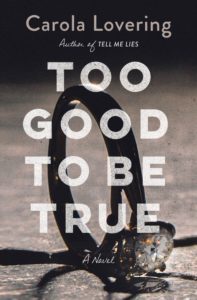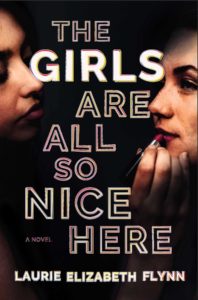Well, so here’s March again, and we are coming up on our one-year anniversary of pandemic lockdown (with a way too brief respite last summer). People are getting weird. Maybe it’s the endless ice and snow, rain and hail, lather rinse repeat of the Canadian winter, but I find myself and hear other people talking to people just to talk. Torontonians are not chatty, but suddenly everyone from the pharmacy (Shoppers, the Duane Reade of Toronto) to the ice cream place (Ed’s Real Scoop) is small talking up a storm. Such are the constraints of the way we live now.
But there are books—yes, thank you for the books, we need them even if we have gotten into the habit of jumping promiscuously from thriller to thriller and then after nothing holds our attention watching some Housewives and returning to the books with the hope that they will be more thrilling this time. Here are a few that made me turn off the TV.

Sara Davis, The Scapegoat (FSG)
I’m always pleased to recommend a debut, and even more so when it’s as sharp as Davis’s. For some reason, this book feels French—it has the claustrophobic tautness of The Perfect Nanny. It also has the compression of Jean-Paul Manchette: the novel takes place over the course of a fortnight, and we are in the mind of a man who is losing his grip on reality. There is another critic who would wax here about postmodernism but I am not them: the unstable narrator is not a 20th or even 19th-century invention. It persists because it attracts and repels. Davis deftly handles the internal breakdown of her narrator, N, as it is related to the mysterious death of his estranged father, and serves up a satisfying mystery along with the chronicles of a breakdown.

Debbie Babitt, Saving Grace (Scarlet/WW Norton)
Babitt’s debut casts a wide net. Protagonist Mary Grace Dobbs has a Harry-Potter-Before-Hogwarts childhood: orphaned at age 11, she is forced to live with her Bible-thumping, Bible-selling uncle, an invalid aunt, and a very, very mean cousin. When she finally makes some friends—including a bestie at last—they up and disappear. Adult Mary Grace is the sheriff of the town of Repentance and the mother of a sixth grader when another child vanishes. There are similarities to the old disappearances, and some white supremacists in the mix too. Mary Grace has a lot going on in Repentance, and repentance.

Carola Lovering, Too Good to Be True (St. Martin’s)
I was a fan of Lovering’s first book, Tell Me Lies, a look into the life and mind of the male Lothario—you know, the guys you dated who could have been the villain in a John Hughes movie. This one doesn’t disappoint: Lovering knows that guy in his many guises, from stealthy schoolyard bully to high school hallway bully to experienced older guy who promises to take care of you yet is secretly a bully. If you like your romances twisted, you have found your new favorite author.

Alexandra Andrews, Who Is Maud Dixon? (Little Brown)
A question for a title? Why not? Domestic suspense deals in all sorts of questions. In Dixon Andrews is interested in questions about identity, writing, and authorship and she packs a good number of twists set amidst the scenery of Morocco. This nimble book is a cross between Renee Knight’s The Secretary (office politics), Alice Feeney’s Sometimes I Lie (amnesia and other memory issues), with a dash of Christine Mangan’s Tangerine (creepy female friendships in North Africa).

Laurie Elizabeth Flynn, The Girls Are All So Nice Here (Simon & Schuster)
Flynn’s has a couple of YA books to her credit and her debut thriller reflects time spent in the murky unpredictable waters of the lives of teenage girls. The characters in Girls (or is Nice better as Girls makes me want to do a new installation of the Great Crime Fiction Disambiguation Project, tweet us if you are up for it) are older but still harboring secrets in a social economy where the currency is personal information whether it’s true or false. Flynn’s book is both sophisticated and brutal, like a teenage girl you probably know.

















